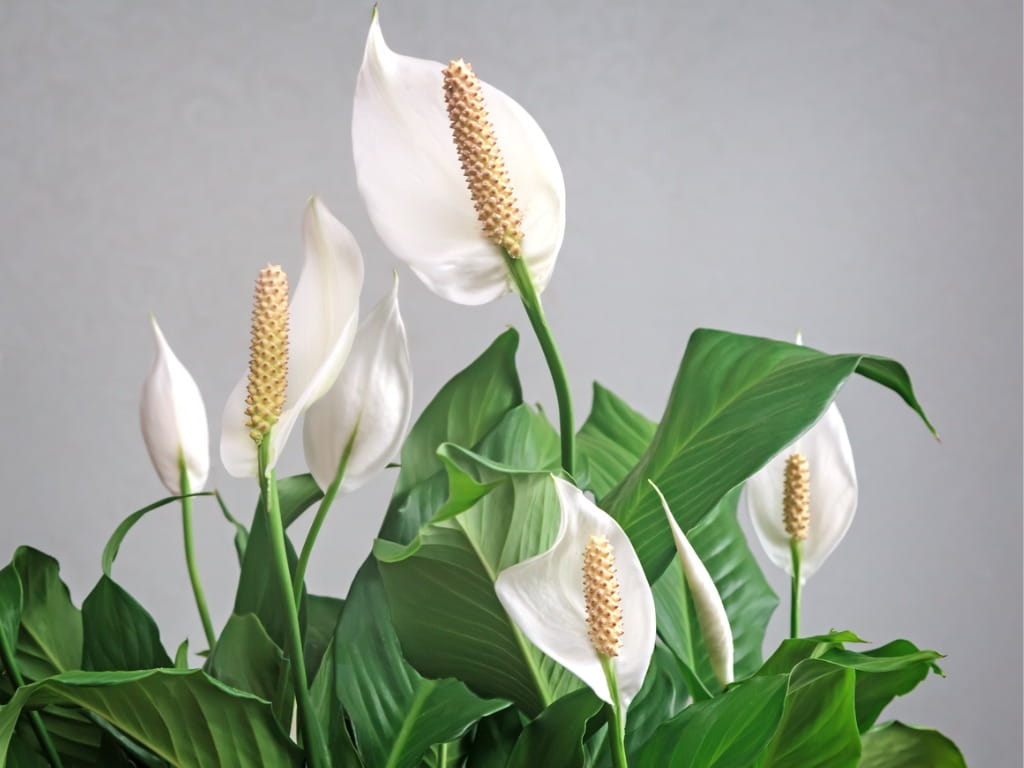Are Peace Lilies Poisonous?

The Bottom Line
The peace lily is one of the most common household plants Poison Control is called about. The flowers, leaves, and stems of the peace lily contain very small, insoluble calcium oxalate crystal that can cause immediate mouth and throat irritation if chewed or swallowed.

What are peace lilies?
The peace lily (Spathiphyllum) is a popular household plant that is characterized by glossy, dark green, oval leaves, and a prominent large white spathe surrounding miniature flowers. In North America, the most common species include:
Spathiphyllum wallesii (Mauna Loa peace lily)
Spathiphyllum commutatum (Bischerad)
Spathiphyllum clevelandii (white Anthurium)
Spathiphyllum floribundum (snowflower)
Is the peace lily plant toxic to humans?
The flowers, leaves, and stems of the peace lily contain very small, insoluble calcium oxalate crystals similar to those found in dieffenbachia, philodendron, cala lily, alocasia, and several other plants. When ingestion of any part of a piece lily occurs, it can cause immediate discomfort and mechanical injury to the mouth. This can lead to mouth and throat irritation, swelling of the lips, coughing, nausea, and vomiting. Most exploratory or minor ingestions can be managed at home.
What should I do if someone eats part of a peace lily?
If someone has chewed or swallowed part of a peace lily plant, you can try some of these tips:
- Gently wipe out their mouth.
- Help them to rinse and spit with water to remove any remaining pieces from their mouth.
- If there is any mouth irritation present, try offering ice chips to suck on or frozen treats to help relieve the pain.
- Hold off on giving large volumes of fluids if the person is having excessive drooling, severe mouth swelling, or difficulty swallowing.
If you suspect someone has been exposed to a peace lily plant, get an immediate personalized recommendation online or call Poison Control at 1-800-222-1222. Both options are free, confidential, and available 24 hours a day.
Kristina Yee, PharmD
Certified Specialist in Poison Information
Poisoned?
Call 1-800-222-1222 or
Prevention Tips
- Have a knowledgeable expert identify the plants and trees growing in your home, backyard and neighborhood, so you know which ones are harmful and which ones are OK for children and pets.
- Consult our helpful plant guide.
- Never eat an unknown plant or seed without verification from a clear field guide or someone with experience.
This Really Happened
A mother called Poison Control after she noticed her 4-year-old son had chewed on a piece of a peace lily leaf. The boy was fussy and acting like his mouth was bothering him, but he did not show any signs of swelling or breathing difficulty. Poison Control advised the mother to offer small sips of milk or (if available) ice cream or popsicles and to watch for any persistent vomiting, swelling of the mouth, or respiratory symptoms. Two hours later, Poison Control called the mother, and she reported that her son was doing much better after drinking some milk.For More Information
Peace lily. Bloomington (MN): Pet Poison Hotline [cited 2 Sep 2022].
References
Poisoned?
Call 1-800-222-1222 or
Prevention Tips
- Have a knowledgeable expert identify the plants and trees growing in your home, backyard and neighborhood, so you know which ones are harmful and which ones are OK for children and pets.
- Consult our helpful plant guide.
- Never eat an unknown plant or seed without verification from a clear field guide or someone with experience.
